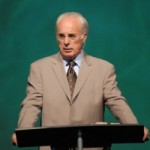 Dr. John MacArthur writes:
Dr. John MacArthur writes:
Semper reformanda (“always reforming”) is one of the enduring slogans often associated with the Protestant Reformation. The origins of the phrase are murky and probably date from the late 1600s. But the kernel of the idea is true enough: Until we are glorified—until we are fully, finally, perfectly conformed to the exact likeness of Christ—we as saints individually, and the whole church collectively, must always be reforming.
The idea is not that we should change for the sake of change. You can be sure that whoever first penned that slogan was not urging Christians to stay abreast of every wind of earthly fashion in order to suit someone’s shallow notion of “relevance.” Nor does the principle of semper reformanda require us to rewrite our doctrinal standards every generation in order to keep in step with the constantly-changing dogmas of human philosophy.
On the other hand, real Reformation is not about slavish subscription to one particular set of seventeenth-century confessional standards—as if the magisterial Reformers or their immediate successors reached a level of ecclesiastical and doctrinal perfection beyond which further reform is impossible. According to that view, you’re not truly Reformed if, for example, you reject paedobaptism or you employ musical instruments and hymns in your worship rather than strictly limiting your singing to metrical psalms sung a capella.
John Calvin was under no illusion that the Reformation had reached its goal in his lifetime—or that it would get there in a generation or two. He wrote,
Christ “loved the church, and gave himself for it, that he might sanctify and cleanse it with the washing of water by the word, that he might present it to himself a glorious church, not having spot, or wrinkle, or any such thing; but that it should be holy and without blemish,” (Eph. 5: 25-27.) Nevertheless, it is true, that the Lord is daily smoothing its wrinkles and wiping away its spots. Hence it follows that its holiness is not yet perfect. Such, then, is the holiness of the Church: it makes daily progress, but is not yet perfect; it daily advances, but as yet has not reached the goal. (Institutes, 4.1.17)
Here’s the point: the only true and valid reformation occurs as we align our beliefs, our behavior, and our worship with the Word of God. In fact, the full, unabbreviated version of the Latin slogan is Ecclesia reformata et semper reformanda secundum verbum Dei (“The Church Reformed and always reforming according to the Word of God.”)
God’s Word is the only true standard we have a divine mandate to conform to, and it is the ultimate standard by which we will be judged. Success or failure in ministry therefore cannot be evaluated by numerical statistics, financial figures, popularity polls, public opinion, or any of the other factors the world typically associates with “success.” The only real triumph in ministry is to hear Christ say, “Well done.”

![spurgeon_sm[1]](https://effectualgrace.com/wp-content/uploads/2011/08/spurgeon_sm11-300x225.jpg)